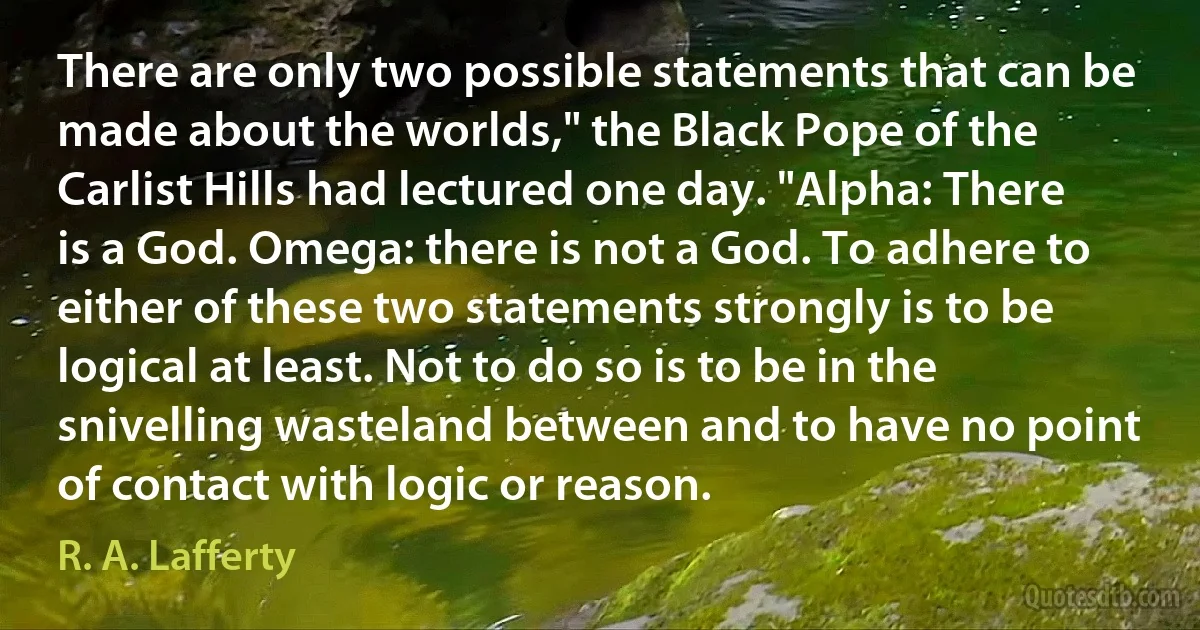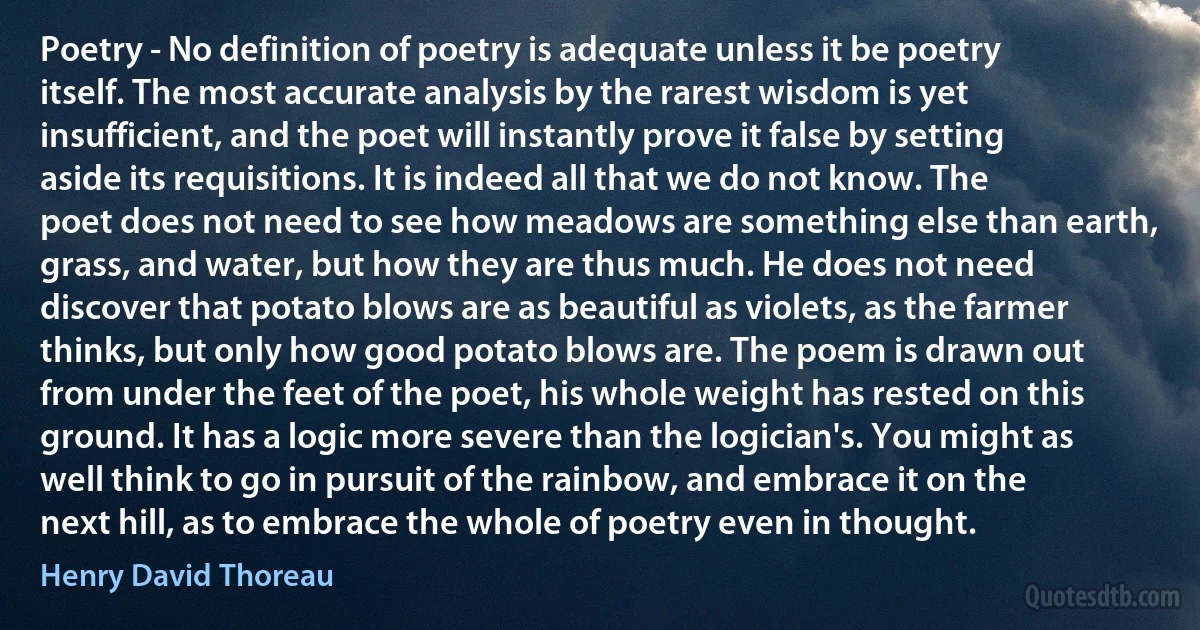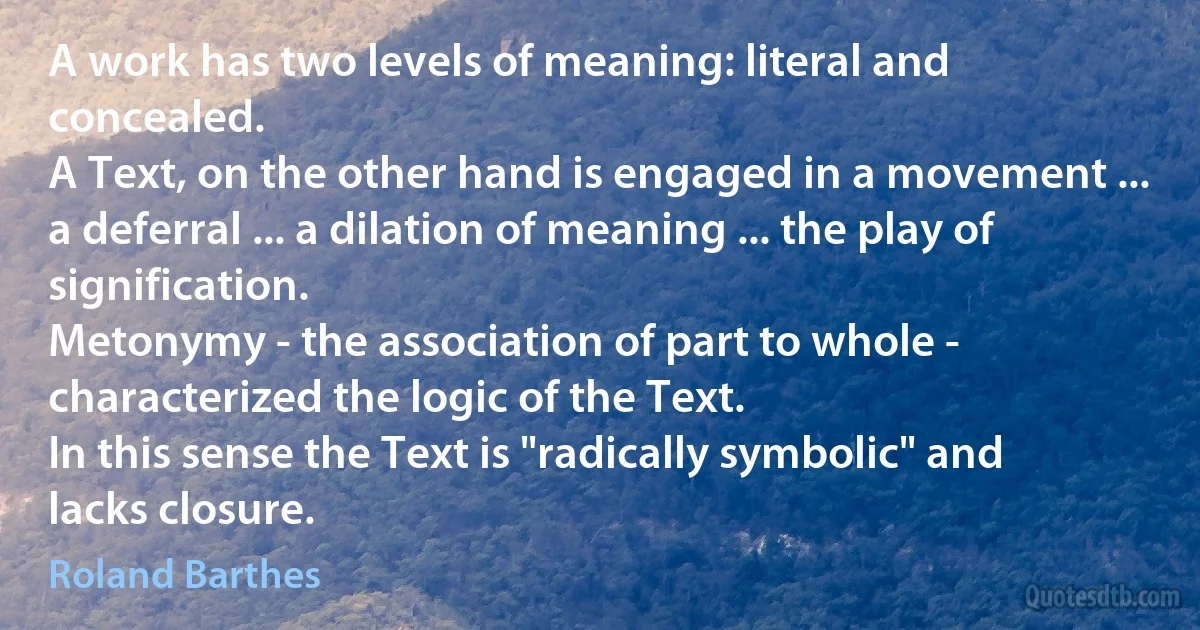Logic Quotes - page 39
It is not possible to put the Gospel and secular logic together. In the Gospel there is love, while in secular logic there is self-interest. The Gospel says, And if any one forces you to go one mile, go with him two. (Mt. 5:41) What is logical about this saying? This is surely madness! This is why those who try to reconcile the Gospel with secular logic find themselves in utter confusion.

Paisios of Mount Athos
Easy to make rules,” Emma said. "Easy to make systems with a perfect logic and rigor. All you need to do is leave out the mercy, yeah? Then when you put people into it and they get chewed to nothing, it's the person's fault. Not the rules. Everything we do that's worth shit, we've done with people. Flawed, stupid, lying, rules-breaking people. Laconians making the same mistake as ever. Our rules are good, and they'd work perfectly if it were only a different species.”
"You sound like someone I know,” Naomi said.
"I'll die for that,” Emma said. "I'll die so that people can be fuckups and still find mercy.

Daniel Abraham
It is the sophists, with Protagoras in the lead, who are the true precursors of modern thought; they are the "thinkers" properly so-called, in the sense that they limited themselves to reasoning and were hardly concerned with "perceiving" and taking into account that which "is". And it is a mistake to see in Socrates, Plato and Aristotle the fathers of rationalism, or even of modern thought generally; no doubt they reasoned − Shankara and Ramanuja did so as well − but they never said that reasoning is the alpha and omega of intelligence and of truth, nor a fortiori that our experiences or our tastes determine thought and have priority over intellectual intuition and logic, quod absit.

Frithjof Schuon
Um,” said Kesrick in a small voice, looking remarkably foolish.
"Um, indeed!” said Dame Pirouetta tartly. "You will find, dear boy, on these chivalric adventures of yours, that manly courage and fortitude, even when bolstered by the fortunate possession of an enchanted sword such as Dastagerd, are not quite enough: one requires, as well, the use of logic, reason, deduction, and, in a word-intelligence!

Lin Carter
One cannot state too clearly that a doctrinal formulation is perfect, not because it exhausts the infinite Truth on the plane of logic, which is impossible, but because it realizes a mental form capable of communicating, to whoever is intellectually apt to receive it, a ray of that Truth, and thereby a virtuality of the total Truth. This explains why the traditional doctrines are always apparently naive, at least from the point of view of philosophers − that is to say, of men who do not understand that the goal and sufficient reason of wisdom do not lie on the plane of its formal affirmation; and that, by definition, there is no common measure and no continuity between thought, whose operations have no more than a symbolic value, and pure Truth, which is identical with That which "is" and thereby includes him who thinks.

Frithjof Schuon
In Science the paramount appeal is to the Intellect - its purpose being instruction; in Art, the paramount appeal is to the Emotions - its purpose being pleasure. A work of Art must of course indirectly appeal to the Intellect, and a work of Science will also indirectly appeal to the Feelings; nevertheless a poem on the stars and a treatise on astronomy have distinct aims and distinct methods. But having recognised the broadly-marked differences, we are called upon to ascertain the underlying resemblances. Logic and Imagination belong equally to both. It is only because men have been attracted by the differences that they have overlooked the not less important affinities.

George Henry Lewes
He claims all successes and attributes the failures to others, he accepts no more criticism and he demands unquestioning obedience to his commands, his judgment must be the judgment of all, his logic must be that of his co-workers, his conscience must be the conscience of others, he is so accustomed to crushing any opposition or sensitivity in his associates that he dares to ask them anything.

Leopold II of Belgium
At Chicago, Hayek put aside his more technical economic work for the development of a social and political theory that became in time the most ambitious and complete synthesis to emerge from the ranks of the post-war Right. Among its themes - the overriding significance of the rule of law, the need for social inequality, the function of unreflective tradition, the value of a leisured class - were many cultivated by Strauss across the campus. Neither thinker, however, ever referred to the other. Did temperamental antagonism, or intellectual indifference, dictate the silence? Whatever the case, latent tensions of outlook between them were to find expression in due course. Schmitt, on the other hand, was never far from Hayek's mind – standing for the prime example of a skilled jurist whose sophistry helped to destroy the rule of law in Germany, yet a political theorist whose stark definitions of the nature of sovereignty and the logic of party, at any rate, had to be accepted.

Friedrich Hayek
Though Hayek clearly allows for the possibility of a retreat from socialism, whether of the hot (command planning) or cold (welfare state) variety, and planning, Hayek's critics, apparently taking Hayek at his word, use 'inevitability' to refer to the outcome (a totalitarian polity) that, according to Hayek, is supposedly generated by the cumulative logic inherent to interventionist policy and welfare state practices. Though taking care to note that a change in policy may occur, Hayek apparently considers the logic of intervention as primarily nudging policy in one direction, necessitating ever-further government intervention.

Friedrich Hayek
Hayek [...] seemingly would severely limit mankind's ability to design the future through the process of working things out. But Hayek rejects neither reason nor deliberative critique nor constructivism. The exercise of reason in deliberative critique in the service of reconstruction of economy, polity, and society is not only called for but is part and parcel of the Mengerian argument. Constructivism is inherent in the body of social theory developed by Hayek. Constructivism is practiced by Hayek. It is the fundamental logic of his life's work. In a sense, his own practice constitutes the negation of his own argument.

Friedrich Hayek
Hayek should be taken seriously because he has correctly identified as the most serious problems confronting civilization in the twentieth century the problems of nationalism and totalitarianism. Even with the dereliction of European communism at the end of the twentieth century, the problems which remain or are reemerging in the shape of ethnic conflict, separatist national movements, and regional trading blocs stem from practices and ideas which the liberal tradition has consistently criticized: ideas hostile to individualist, universalist, and egalitarian moral principles. While thinkers like Hannah Arendt have also recognized the threat and moral danger posed by totalitarianism, it is in Hayek's work that we have the most thorough attempt to understand the logic of its institutional alternative.

Friedrich Hayek
Today the entire academia and media in India are under the stranglehold of this state-sponsored version of India's history which is eulogized as the secular version, and is supposed to promote national integration. Voices of dissent are met not with solid evidence or straight logic but with a swearology coined by subversive politics.

Sita Ram Goel
I don't understand why prostitution is illegal. Selling is legal. Fucking is legal. Why isn't selling fucking legal? You know, why should it be illegal to sell something that's perfectly legal to give away? I can't follow the logic on that one at all! Of all the things you can do, giving someone an orgasm is hardly the worst thing in the world. In the army they give you a medal for spraying napalm on people! In civilian life you go to jail for giving someone an orgasm! Maybe I'm not supposed to understand it...

George Carlin
A deep sense of humor and an unusual ability for telling stories and jokes endeared Johnny even to casual acquaintances. He could be blunt when necessary, but was never pompous. A mind of von Neumann's inexorable logic had to understand and accept much that most of us do not want to accept and do not even wish to understand. This fact colored many of von Neumann's moral judgments. "It is just as foolish to complain that people are selfish and treacherous as it is to complain that the magnetic field does not increase unless the electric field has a curl. Both are laws of nature." Only scientific intellectual dishonesty and misappropriation of scientific results could rouse his indignation and ire - but these did - and did almost equally whether he himself, or someone else, was wronged.

E. P. Wigner
At any rate, the BMAC's frontal display of contempt for logic and rational method has not pitted any secularist against the BMAC position. For them no allegations of replacing historical knowledge with myth or "faith”; which adds further illustration to our view that the whole rhetoric of historicity vs. faith was never anything else than a dispersionary tactic to put the Hindus on the defensive.

Koenraad Elst
Miracles in mysticism don't occupy such an important place. It's metaphor, for the peasants, for the crowds, to impress people. What does mysticism really mean? It means the way to attain knowledge. It's close to philosophy, except in philosophy you go horizontally while in mysticism you go vertically. You plunge into it. Philosophy is a slow process of logic and logical discourse: A bringing B bringing C and so forth. In mysticism you can jump from A to Z. But the ultimate objective is the same. It's knowledge. It's truth.

Elie Wiesel
"When all men have made themselves equal, we shall be forced to unite."
"And there'll no longer be appalling things done in the face of heaven by thirty million men who don't wish them."
It is true, and there is nothing to reply to it. What pretended argument or shadow of an answer dare one oppose to it - "There'll no longer be the things done in the face of heaven by thirty millions of men who don't want to do them!"
Such is the logic that I hear and follow of the words, spoken by these pitiful fellows cast upon the field of affliction, the words which spring from their bruises and pains, the words which bleed from them.
Now, the sky is all overcast. Low down it is armored in steely blue by great clouds. Above, in a weakly luminous silvering, it is crossed by enormous sweepings of wet mist. The weather is worsening, and more rain on the way. The end of the tempest and the long trouble is not yet.

Henri Barbusse
Few persons care to study logic, because everybody conceives himself to be proficient enough in the art of reasoning already. But I observe that this satisfaction is limited to one's own ratiocination and does not extend to that of other men.
We come to the full possession of our power of drawing inferences the last of all our faculties, for it is not so much a natural gift as a long and difficult art.

Charles Sanders Peirce
In randori we learn to employ the principle of maximum efficiency even when we could easily overpower an opponent. Indeed, it is much more impressive to beat an opponent with proper technique than with brute force. This lesson is equally applicable in daily life: the student realized persuasion backed up by sound logic is ultimately more effective than coercion.

Jigoro Kano



